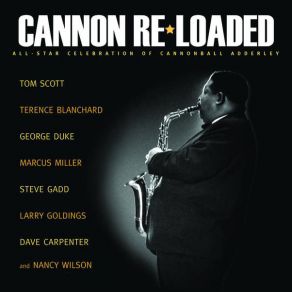Cannon Re-Loaded - An All-Star Celebration of Cannonball Adderley
Download links and information about Cannon Re-Loaded - An All-Star Celebration of Cannonball Adderley by Tom Scott. This album was released in 2008 and it belongs to Jazz, Contemporary Jazz genres. It contains 10 tracks with total duration of 52:29 minutes.

|
|
|---|---|
| Artist: | Tom Scott |
| Release date: | 2008 |
| Genre: | Jazz, Contemporary Jazz |
| Tracks: | 10 |
| Duration: | 52:29 |
| Buy it NOW at: | |
| Buy on iTunes $9.99 | |
Tracks
[Edit]| No. | Title | Length |
|---|---|---|
| 1. | Jive Samba | 6:34 |
| 2. | Work Song | 5:49 |
| 3. | Mercy, Mercy, Mercy | 5:49 |
| 4. | Save Your Love for Me (feat. Nancy Wilson) | 4:51 |
| 5. | Sack O' Woe | 5:30 |
| 6. | Country Preacher | 3:19 |
| 7. | Inside Straight | 5:05 |
| 8. | I Should Care | 5:47 |
| 9. | The Masquerade Is Over (feat. Nancy Wilson) | 5:27 |
| 10. | Stars Fell On Alabama | 4:18 |
Details
[Edit]Cannon Re-Loaded is simply that: a collection of tunes closely associated with Cannonball Adderley interpreted by an all-star collection of players on the current scene, with bandleader Tom Scott (who co-produced with Gregg Field) on alto saxophone (an instrument he doesn't play that often anymore), trumpeter Terence Blanchard, pianist George Duke (who was actually a member of the Adderley quintet and who also plays Rhodes and Wurlitzer), drummer Steve Gadd, bassists Marcus Miller and Dave Carpenter, and Larry Goldings on the Hammond B-3. Vocalist Nancy Wilson also guests on a pair of cuts that reprise her performances with Adderley from the Nancy Wilson/Cannonball Adderley set released in 1962. In his liner notes, Scott claims Adderley as a major influence on his own playing, and that what he and his dream band wanted to convey was not only Adderley's brilliance as a musician, but also his sense of humor, one that welcomed the audience in to the music he made.
There is no doubt that this quintet gets the tunes right. They open with "Jive Samba," move toward a fast-paced "Work Song," and then of course to "Mercy, Mercy, Mercy" before Wilson joins the band for "Save Your Love for Me." The music has plenty of swing and groove, and it's tight. And maybe that's the problem. Adderley's best records (we could all argue forever about which records those were) had a sense of looseness and a vibe inherent in them that is lost on this group — with the exception of Duke, who uses his own sense of humor, percussive flair on the keys, and angular bits here and there to dress these jams up for the bandstand instead of the studio. The sound is so utterly pristine and shiny it contains none of that laid-back approach that made the Adderley groups so enjoyable.
For audiophiles, there is plenty to like: the stereo separation is perfect. There isn't a sound out of place here, with the occasional exception of Duke's touches that at least give the thing some air. "Mercy, Mercy, Mercy" and "Work Song," feel like they're being read off the page — and we know that isn't so. Wilson's tunes "Save Your Love for Me" and "The Masquerade Is Over" come off beautifully, but they don't really echo the originals, they feel like standard contemporary jazz radio fare. Thanks to the Rhodes and B-3, "Country Preacher" comes off best because of the interplay between Goldings and Duke. They let so much soul drip from their respective keyboards that Scott can't make it shine so much., He has to stay closer to the warmth of the tune, and Blanchard, who actually might have been a bandleader in this setting, has got everything he needs in the melody to just let it fall out of his horn. "Inside Straight," while it has the melody, changes, and timing right, is so slick because of Miller's slaphappy bass; it contains a kind of mellowed-down funk that belongs on the studio-perfected jazz records released in the '80s. Thankfully, Blanchard lets some real grit come from his horn. The ballads "I Should Care" and "The Stars Fell on Alabama" come off better than just about anything here because of their reliance on more restrained charts (particularly on the former, with Blanchard's wonderful solo). Scott's solo is less his than Adderley's on the latter. He restrains himself from over-blowing for the most part, and allows some real emotion into the tune.
Overall though, this date may introduce contemporary jazz fans to the music of Adderley, but it doesn't begin to capture his spirit, his irreverent, dry and elegant sense of humor, or the sheer power he could wrench form a funky blues tune, or the soul he could dig out of that horn — especially in front of an audience. Perhaps if this band would have cut this in front of a club crowd, they might have been able to get more inside the vibe of Adderley. As it stands, it sounds so controlled and rigid that it's simply a pleasant recording to listen to rather than a real tribute to one of the giants of jazz who was also one of its greatest communicators. And while we're at it, one has to wonder why some of Adderley's great soul classics like Black Messiah, Accent on Africa, Pyramid, Happy People, and Music You All have never been issued on CD?